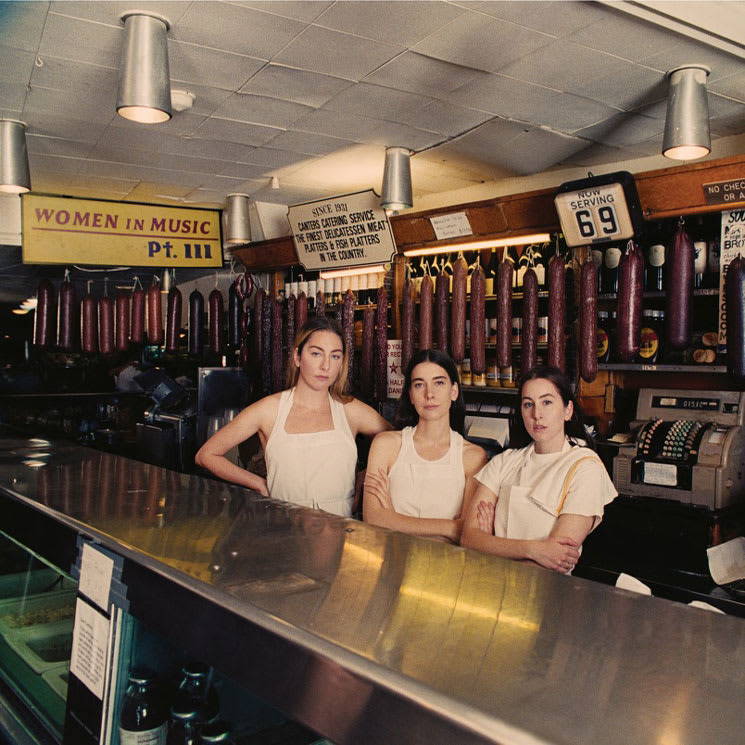There's always been an incongruity between HAIM in the studio and HAIM on stage. Whereas the trio's first two albums were polished and smoothed out to the point where it's difficult to tell where the instruments end and the computers begin, live and in interviews, sisters Alana, Este and Danielle are far more willing to let it all hang out.
Women in Music Pt. III, the group's third and best album, finally circles the square, blending their musical prowess and innately likeable personalities with the studio sheen that we've come to expect from their brand of 21st century L.A. pop-rock.
Los Angeles haunts the record. The city has always been a source of inspiration for the band. From their earliest singles, '70s Laurel Canyon rock was clearly a foundational element of their sound. Yet here, they embrace it like never before, from the record's opening track, a love letter to their hometown, to the musical nods to heroes like Stevie Nicks (bonus track "Now I'm in It") and Joni Mitchell ("Man from the Magazine").
In between, we get some of their most personal lyrics to date. HAIM have always been autobiographical writers, but now the words, images, scenes and characters come alive with a specificity they've lacked in the past.
"Summer Girl," once thought to be the album's brilliant lead single, now relegated to a bonus track for some bizarre reason, addresses long-time producer (and Danielle's partner) Ariel Rechtshaid's testicular cancer diagnosis: "Walk beside me, not behind me / Feel my unconditional love." Meanwhile on acoustic ballad "Hallelujah," co-written with Tobias Jesso Jr., Alana pays tribute to her best friend who died in a car crash.
The raw emotions are augmented by production that favours ambiance over precision. Live drums, sustained piano notes, breathing, the sound of the studio — all are audible, imbuing a spontaneous energy into the performances. Whereas the dullest moments of 2017's Something to Tell You sounded like playlist fodder, here each song carries its own personality, for better or worse. (It's almost always better.)
Still, working almost exclusively with experienced modern pop producers Rechtshaid and Rostam Batmanglij, the band lean into technology where appropriate. Women in Music Pt. III flips between the band's least and most processed work to date. Both sides yield highlights.
Through this lens, the record's title works on a number of different levels; as statement of fact, a reclamation of the term, or call to arms. It's as multifaceted as the music it encapsulates and the women who made it.
(Sony)Women in Music Pt. III, the group's third and best album, finally circles the square, blending their musical prowess and innately likeable personalities with the studio sheen that we've come to expect from their brand of 21st century L.A. pop-rock.
Los Angeles haunts the record. The city has always been a source of inspiration for the band. From their earliest singles, '70s Laurel Canyon rock was clearly a foundational element of their sound. Yet here, they embrace it like never before, from the record's opening track, a love letter to their hometown, to the musical nods to heroes like Stevie Nicks (bonus track "Now I'm in It") and Joni Mitchell ("Man from the Magazine").
In between, we get some of their most personal lyrics to date. HAIM have always been autobiographical writers, but now the words, images, scenes and characters come alive with a specificity they've lacked in the past.
"Summer Girl," once thought to be the album's brilliant lead single, now relegated to a bonus track for some bizarre reason, addresses long-time producer (and Danielle's partner) Ariel Rechtshaid's testicular cancer diagnosis: "Walk beside me, not behind me / Feel my unconditional love." Meanwhile on acoustic ballad "Hallelujah," co-written with Tobias Jesso Jr., Alana pays tribute to her best friend who died in a car crash.
The raw emotions are augmented by production that favours ambiance over precision. Live drums, sustained piano notes, breathing, the sound of the studio — all are audible, imbuing a spontaneous energy into the performances. Whereas the dullest moments of 2017's Something to Tell You sounded like playlist fodder, here each song carries its own personality, for better or worse. (It's almost always better.)
Still, working almost exclusively with experienced modern pop producers Rechtshaid and Rostam Batmanglij, the band lean into technology where appropriate. Women in Music Pt. III flips between the band's least and most processed work to date. Both sides yield highlights.
Through this lens, the record's title works on a number of different levels; as statement of fact, a reclamation of the term, or call to arms. It's as multifaceted as the music it encapsulates and the women who made it.
